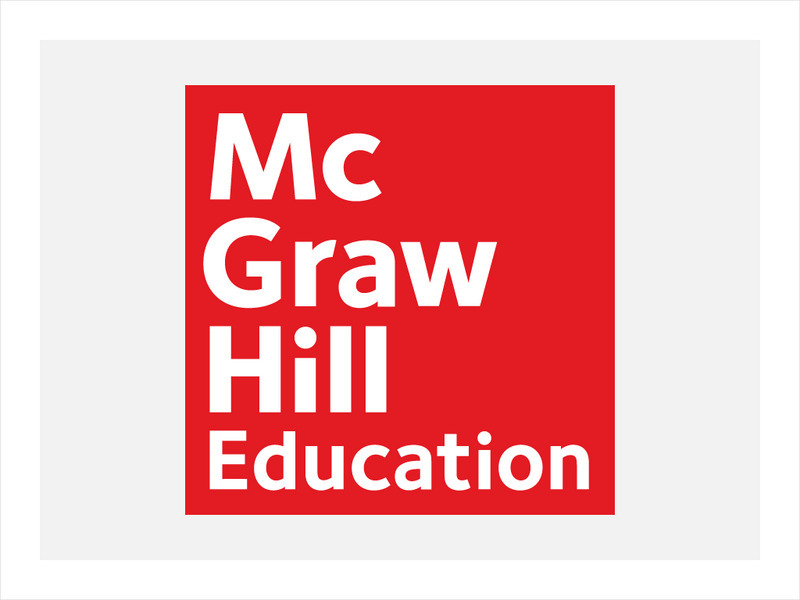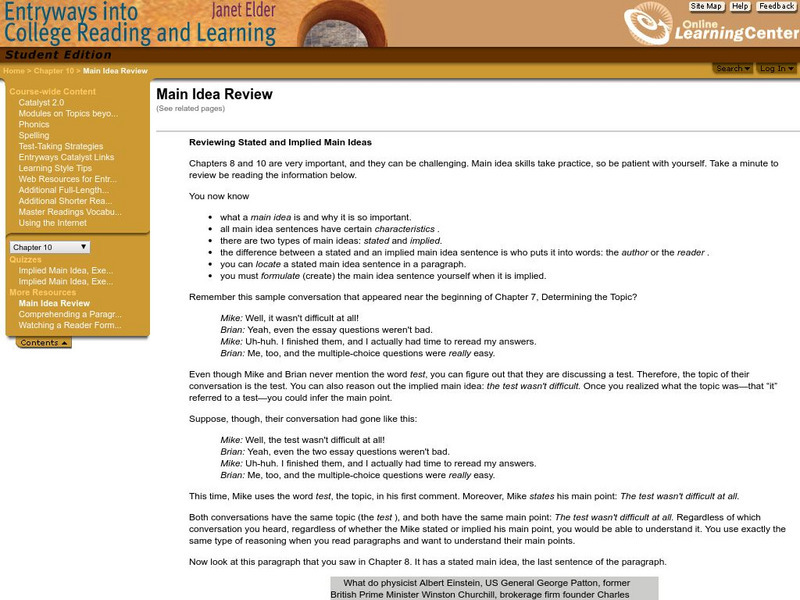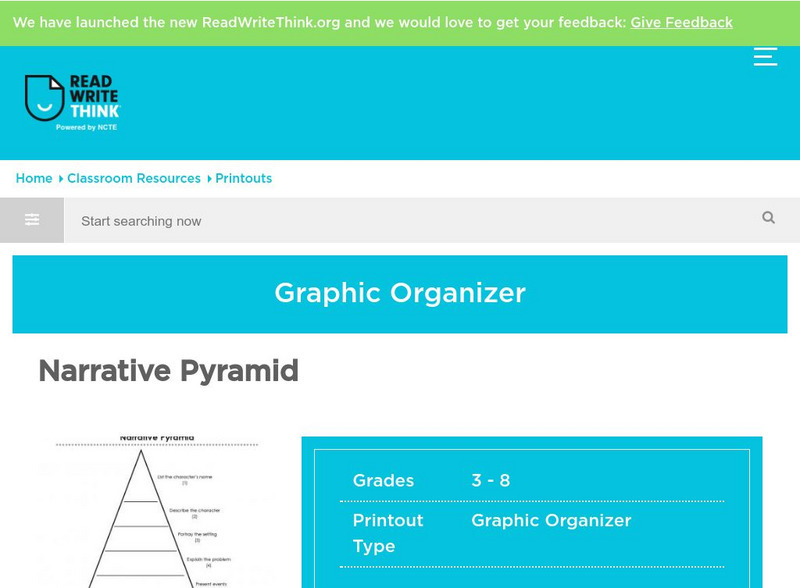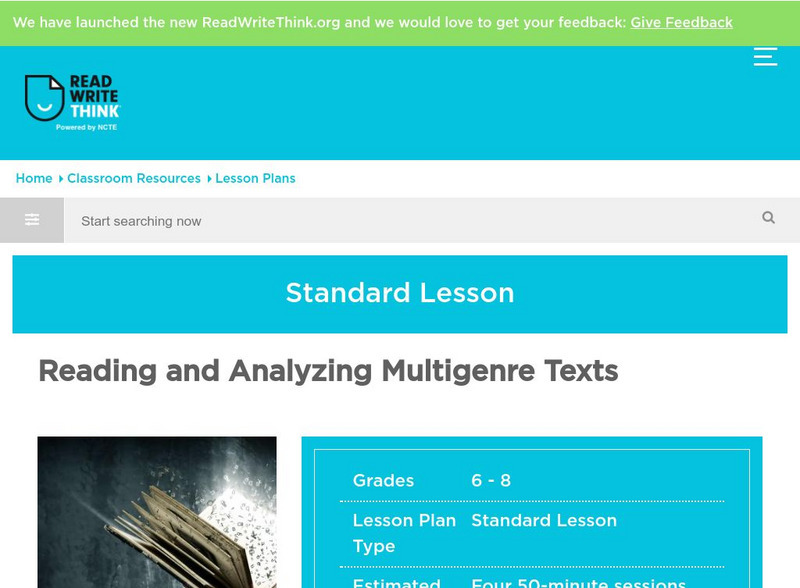Wisconsin Response to Intervention Center
Wisconsin Rt I Center: Text Dependent Questions [Pdf]
Describes a reading strategy where students must respond to text by supporting their ideas with text-based evidence. Lists different categories of questions the teacher can prepare based on the text chosen, with examples for each.
Curated OER
Mc Graw Hill: Part 2 Reading: Determine Main Ideas and Supporting Details
See an example of how to determine the main ideas and supporting details of a story.
Curated OER
Mc Graw Hill: Structure Within a Story
Learn why structure is important when organizing a story then read an excerpt from the story "Three over Four" to practice how structure helps to develop the story's theme, setting, and plot.
Grammarly
Grammarly Handbook: Patterns of Organization for Academic Texts
A list of six different ways to organize a text with links to more information for each.
Polk Brothers Foundation Center for Urban Education at DePaul University
De Paul University: Center for Urban Education: I Can Analyze a Story or History [Pdf]
This graphic organizer can be used to help students analyze a story or a historical event. Students will look closely at the story's characters or people involved in the historical event. Then they will summarize the story or event, and...
Polk Brothers Foundation Center for Urban Education at DePaul University
De Paul University: Center for Urban Education: Read to Learn, Share What You Learn [Pdf]
Several tips for reading to learn are provided on this page. Students will explore the BIG idea presented in a nonfiction piece.
Polk Brothers Foundation Center for Urban Education at DePaul University
De Paul University: Center for Urban Education: Classify and Summarize Information [Pdf]
This learning module contains a link to graphic organizers that will help students categorize content and comprehend short and extended texts. The graphic organizers are designed to be applied to reading nonfiction passages in science...
Polk Brothers Foundation Center for Urban Education at DePaul University
De Paul University: Center for Urban Education: Expand Story or History Text Based Dialog[pdf]
Students will use graphic organizers to help them make inferences about historical figures' feeings and motives. Students will summarize the information during an extension activity.
InterLink Language Centers
Interlink Language Centers: Reading Exercises Science
An interactive exercise for students to use while developing an understanding of how to read scientific informational texts. The text is presented one paragraph at a time and difficult vocabulary words are defined as footnotes. Then...
McGraw Hill
Mc Graw Hill:informational Text: Analyze Development of Text Elements:individuals
Read an informational piece, and learn how to analyze the development of individuals in the text. Includes practice exercises.
McGraw Hill
Mc Graw Hill: Informational Text: Analyze Development of Text Elements: Events
Read an informational piece, and learn how to analyze the development of an event in the text.
Curated OER
Mc Graw Hill: Part 1 Reading: Literature: Determine Theme
Determine the theme of a story with this reading activity. See the model and then practice identifying the theme.
McGraw Hill
Mc Graw Hill: Informational Text: Determine Central Idea and Supporting Details
To understand a text, you must understand the central idea of the story. Learn how to recognize the central idea and supporting details with this article. Click the links at bottom right.
Other
Eduscapes: Themes & Literature Circles
This site provides guidance in creating literature circles based on cross-curricular themes that will help to improve literacy. The site emphasizes both theory and practice, with lots of practical suggestions.
McGraw Hill
Mc Graw Hill: Main Idea Review
Exercise reviews the two types of main ideas: stated and implied.
Other
Frontier Central School District: Determining the Theme of a Literary Work [Pdf]
Guidance and exercises for finding the theme of a literary work, including a list of commonly seen universal themes.
ReadWriteThink
Read Write Think: Narrative Pyramid
A printable narrative pyramid where students can record information about a story including the character, setting, problem, main events, and solution. Directions on how to use this type of graphic organize as well as lists of teaching...
ReadWriteThink
Read Write Think: Nonfiction Pyramid
A printable pyramid for use with nonfiction texts while students identify the main ideas and supporting details within a text. Students also determine author's purpose and key vocabulary words. Directions on how to use this type of...
ReadWriteThink
Read Write Think: Get the Gist: A Summarizing Strategy for Any Content Area
A five-part standards-based lesson plan in which students learn to write a 20 word summary of an informational text by focusing on answering the questions who, what, when, where, why, and how. This strategy can be applied to any content...
ReadWriteThink
Read Write Think: Reading and Analyzing Multigenre Texts
This lesson plan deals with the process of analyzing a variety of literary texts from poetry and letters to diary entries and works of fiction. Included in the lesson plan is an overview, practice, objectives, resources, preparation, and...
Quia
Quia: Elements of Literature: Rags to Riches
Answer the 15 questions in this game about literary elements for the prize of fame and fortune. Java is required.
Quia
Quia: Rags to Riches: Literary Elements
Show off your knowledge of literary elements by playing this game. Just answer 15 questions correctly, and be the big winner.
Other
Writing & Reading Success Center: Summarizing Paragraphs [Pdf]
An explanation and example of summarizing a paragraph, especially helpful for taking notes on texts.
Other
English Companion: Reading Expository Text
Taken from "Reading Reminders: Tools, Tips, and Techmiques," the information on this website provides advice on how to read, understand, analyze, and write expository texts.


![Wisconsin Rt I Center: Text Dependent Questions [Pdf] Professional Doc Wisconsin Rt I Center: Text Dependent Questions [Pdf] Professional Doc](https://d15y2dacu3jp90.cloudfront.net/images/attachment_defaults/resource/large/FPO-knovation.png)

![De Paul University: Center for Urban Education: Classify and Summarize Information [Pdf] Unit Plan De Paul University: Center for Urban Education: Classify and Summarize Information [Pdf] Unit Plan](https://content.lessonplanet.com/knovation/original/78057-7ba90e0b8b82fde8e26d306a4af31f79.jpg?1661787062)











